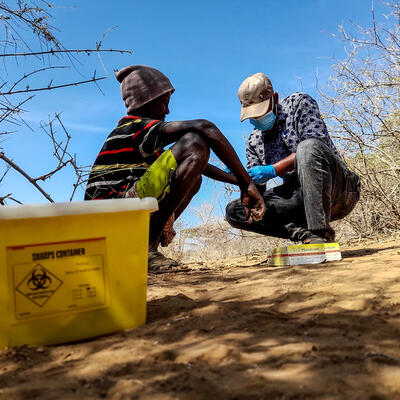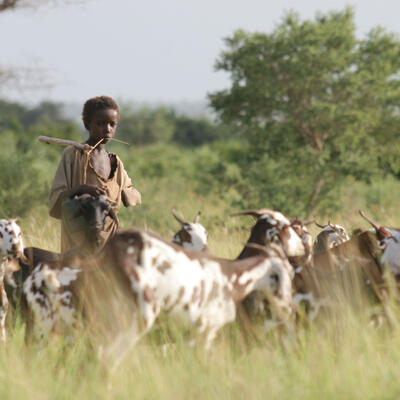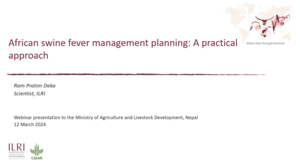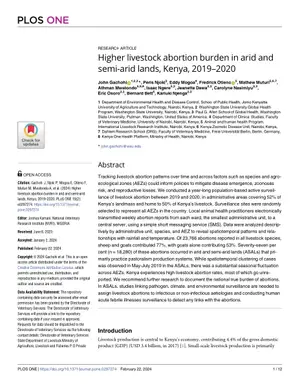

Tony Barbet, ILRAD, University of Florida tickborne disease molecular biologist, dies
Posted on
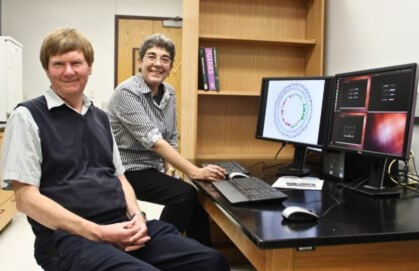
Tony Barbet (left) is pictured with Basima Al-Khedery in 2014 before an image of the genome of a strain of Anaplasma phagocytophilum, a bacterium that causes anaplasmosis, a disease spread to people by bites with infected ticks.
Professor Emeritus Anthony (Tony) Barbet passed away at the age of 73 on 29 February 2024 in Spokane, Washington, USA. Born and raised in England, Tony graduated with a bachelor of science degree from the University of London (Queen Elizabeth College) and earned a PhD in biochemistry from Cambridge University.
In 1976, Tony Barbet joined the International Laboratory for Research in Animal Diseases (ILRAD, which later became the International Livestock Research Institute, ILRI), in Nairobi, Kenya, where he worked for four years on the variable surface glycoprotein (VSG) of the trypanosome parasite (T. brucei) along with colleagues including Tony Musoke, Vinand Nantulya and Travis McGuire. These protozoan parasites cause sleeping sickness (trypanosomiasis) in ruminant livestock and humans through the bit of infected tsetse flies. With each cell division, the parasite can genetically “switch on” a new surface protein, allowing the parasite to evade attack by the immune system of their animal host.
The VSG was a focus of ILRAD’s African animal trypanosomiasis research for many years, as the institute, then a global leader in bovine immunology research, sought ways to protect Africa’s cattle and other livestock from this disease, which was estimated in the 1990s to cost the continent more than one billion US dollars every year. (See this chapter of ILRI’s Impact Book, written by Sam Black, Control of pathogenesis in animal African trypanosomiasis: A search for answers at ILRAD, ILCA and ILRI, 1975-2018, where Tony’s early work on this is cited.)
On leaving ILRAD in 1980, Tony first went to Washington State University at Pullman, where he continued publishing papers of trypanosomes and began research on tick-transmitted rickettsia (Anaplasma marginale), which causes anaplasmosis in cattle, and on tick-transmitted heartwater (also known as cowdriosis, caused by another rickettsia, Cowdria ruminantium.)
Six years later, he moved to the University of Florida’s College of Veterinary Medicine, in Gainesville, where he remained for the next 30 years, leading a research group on tropical vector-borne diseases, including African sleeping sickness and heartwater of sheep and cattle in Africa and the Caribbean, while training numerous graduate students and post-doctoral researchers.
Tony’s University of Florida profile page has a list of his many scientific papers published over nearly half a century, from 1977 through 2022, earning him a distinguished international scientific reputation.
Upon his retirement in 2016, Tony moved back to the UK, where he was diagnosed with cancer. He returned to Spokane, symptom-free, in 2021 to be nearer to his wife’s extended family. Tony is survived by his wife of 41 years, Joy, and his two sons, David and Mark.
Tony’s family, friends and colleagues around the world will miss his humor, kindness, and patience as well as his longstanding scientific leadership and mentorship.
You may also like

ILRI News
Unlocking the power of the genome: A leap towards enhanced food nutrition security and species conservation
ILRI News
The United States Department of Agriculture joins the global race to control contagious bovine pleuropneumonia
Related Publications

Cross-sectional serosurvey of Leptospira species among slaughter pigs, goats, and sheep in Uganda
- Alinaitwe, Lordrick
- Aturinda, C.J.
- Lubega, A.
- Kivali, Velma
- Bugeza, James
- Wainaina, M.
- Richter, M.H.
- Hoona, J.J.
- Roesel, Kristina
- Mayer-Scholl, A.
- Cook, Elizabeth A.J.
- Kankya, C.
- Dürr, S.

Determinants of animal disease and nontherapeutic antibiotic use on smallholder livestock farms
- Emes, E.
- Kagambèga, A.
- Dione, Michel M.

Serological evidence and factors associated with Crimean–Congo haemorrhagic fever in sheep in Burkina Faso
- Dahourou, L.D.
- Akio, S.
- Savadogo, M.
- Yougbaré, B.
- Ouoba, L.B.
- Tapsoba, A.S.R.
- Zerbo, L.H.
- Ilboudo, Abdoul K.
- Abga, R.L.
- Traoré, A.
- Dione, Michel M.
- Alambédji, R.B.

Rationalising development of classification systems describing livestock production systems for disease burden analysis within the Global Burden of Animal Diseases programme
- Yin Li
- McIntyre, K. Marie
- Rasmussen, Philip
- Gilbert, William
- Chaters, Gemma
- Raymond, Kassy
- Jemberu, Wudu T.
- Larkins, Andrew
- Patterson, Grace T.
- Kwok, Stephen
- Kappes, Alexander James
- Mayberry Dianne
- Schrobback, Peggy
- Herrero Acosta, Mario
- Stacey, Deborah A.
- Huntington, Benjamin
- Bruce, Mieghan
- Knight-Jones, Theodore J.D.
- Rushton, Jonathan







